SENT is part of a series of stories of people at Pulpit Rock living missionally in their unique contexts. We believe that all of us have been SENT into our neighborhoods, workplaces and city. Our hope is that you are encouraged and inspired to lean into the places God has called you. And then we’d like to tell your story. Because we know that the story of God’s people is the story of God. If you have a story you would like to share with us send it to info@pulpitrock.com.
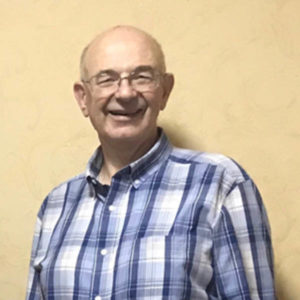 Steve, you recently became involved in advocating for and helping Internally Displaced People (IDP’s) in the Kachin State in Myanmar, how did that come about?
Steve, you recently became involved in advocating for and helping Internally Displaced People (IDP’s) in the Kachin State in Myanmar, how did that come about?
I have actually been traveling to Kachin State, Myanmar for just over 10 years. Most of the time I have gone to teach on topics such as theology of work, biblically-based business principles, and so forth. I was actually in another part of Myanmar when fighting resumed between the Burma Army and the Kachin Independence Army in June 2011. The conflict has continued to the present time, and has resulted in over 100,000 civilians fleeing their villages, with most of them remaining in Internally Displaced Persons (IDP) camps up to the present – nearly 8 years. I first visited some of the camps about 3 or 4 years ago, and was quite troubled by what I learned.
I think it was in about November of 2017 that Thomas challenged us with a question in his message one Sunday. He asked us to think of what we are doing for God’s kingdom, then ask ourselves, “what more could I be doing?” The situation of the IDP’s in Kachin State literally came to my mind immediately. I didn’t have a clue what form any help I could offer might take, let along how to be part of making something happen, but several ideas came into my mind in rapid succession.
Because the people are internally displaced and living in camps that lack practically everything, my thoughts tended toward humanitarian or hygiene things. I knew whatever happened, the program would need to be one that was essentially defined and lead by local people there. And since I was only an individual without the backing of any larger organization, local funding would also need to be a factor.
 Since I would be going back in February (2018) to teach at the request of the Kachin Education Foundation, I contacted a friend who is the leader of a rather large Baptist denomination there. He arranged for me to meet with leaders of some of the camps so I could get good insight into the greatest needs from their perspective. The list of challenges and issues was heartbreaking and long, but I was only one person without much in the way of resources available to me. I really expected I would be returning home with ideas, leaving a promise to try and help somehow. On sort of a whim, I asked the group, “if there were only one thing I could help with, what would it be?” Their response actually caught me by surprise. They said, “help our young people who are entering the 9th and 10th grades to understand English better.”
Since I would be going back in February (2018) to teach at the request of the Kachin Education Foundation, I contacted a friend who is the leader of a rather large Baptist denomination there. He arranged for me to meet with leaders of some of the camps so I could get good insight into the greatest needs from their perspective. The list of challenges and issues was heartbreaking and long, but I was only one person without much in the way of resources available to me. I really expected I would be returning home with ideas, leaving a promise to try and help somehow. On sort of a whim, I asked the group, “if there were only one thing I could help with, what would it be?” Their response actually caught me by surprise. They said, “help our young people who are entering the 9th and 10th grades to understand English better.”
I was unconvinced that this was really what was most important, until I visited some of the camps myself and heard the same thing from some of the adults who had been teachers in the villages they had fled almost seven years earlier. It was explained to me that it is at the 9th grade level that the language of instruction in the government schools changes from Burmese to English. Even though the students have had instruction in English in earlier grades, that instruction is rather poor. The only students who are able to understand the lessons are those whose parents have been able to send them to English “tuition” programs. IDP families can seldom afford that, so their young people drop out of school at the age of 14 or 15 because they can’t understand the lessons.
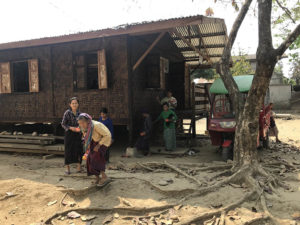 To provide a bit of context, Kachin State is on the edge of the Golden Triangle, an area that rivals Afghanistan as the leading source of heroin poppy globally. It is also well known for its production of methamphetamines, human trafficking and other social ills. When young boys and girls drop out of school at that age in that place, their situation typically shifts from hopelessness to desperation. And their parents’ hearts break knowing what the future holds for their children.
To provide a bit of context, Kachin State is on the edge of the Golden Triangle, an area that rivals Afghanistan as the leading source of heroin poppy globally. It is also well known for its production of methamphetamines, human trafficking and other social ills. When young boys and girls drop out of school at that age in that place, their situation typically shifts from hopelessness to desperation. And their parents’ hearts break knowing what the future holds for their children.
My friend and I began talking about what could be done, and what it would take to do something for some of the students in the camps. He arranged a meeting with a couple of leaders of an indigenous NGO, who offered to voluntarily work with us to see what we could do. Even with volunteers doing much of the teaching, transportation, and so forth, there were still some expenses that would need to be covered. As it turns out, the foundation that I had been teaching for gave me an honorarium. I left that, plus a little more with my friends. They also raised a rather significant amount locally from people they knew. As a result, we ended up offering English language and mathematics programs in two locations for students going into 9th and 10th grades.
I would also like to mention that my friend said we needed to call our program something, so they could promote is more effectively. I had previously come across a Hebrew word that I felt could work. The term is “tzedakah” and it relates to acts of charity that are done where the donor and the beneficiary do not know who each other are. This appealed to me because I did not really want the people in the IDP camps to know that some guy from the US had something to do with funding it. So that became the name of our program – the Tzedakah Education Program. We had about 85 students in the program that first year from probably 5 or 6 different camps, representing 3 or 4 of the subgroups of the Kachin ethnic group.
Many are likely unfamiliar with the IDP’s in Kachin State, what is something you wish that we knew and understood?
The government and the military are dominated by the Buddhist majority of the nations’ population. Over that past year or so there has been quite a bit of news about atrocities carried out by the Burma Army and some of the Buddhist people against the Muslim Rohingya people who live in the western part of Myanmar. Many governments, including our own (at least occasionally) have referred to those actions as being genocide. The Burma Army has been accused of being quite brutal in their attacks against the civilian population there, resulting in over 700,000 fleeing to Bangladesh and other countries of Southeast Asia. Something I really wish more Christians were aware of is that our brothers and sisters in other parts of Myanmar (Western missionaries arrived in Kachin State in the 1880’s, and the vast majority of Kachin converted from Animism to Christianity) have been subjected to similar brutalities and oppression for decades. Villages have been ravaged, women and girls have been raped, rice paddies have laced with anti-personnel mines, civilians have been forced to serve as porters, made to wear the uniform of the Burma Army and placed in precarious positions, and used as human mine sweepers, and the list goes on. That conflict continues even now. Peace negotiations are on-going, but so far there has not been a resolution.
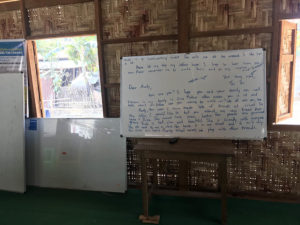 The socio-political situation in that area is particularly challenging, to be sure. Kachin State shares a border with China, and Chinese companies want (and have, by way of agreement with Burma Army generals and their cronies) access to the significant natural resources of Kachin State. The Chinese government has forced people fleeing the conflict in Kachin and neighboring Shan State back across the border into the conflict zone. They have also routinely blocked humanitarian aid from being delivered through China to displaced people on the Kachin Independence Army’s side of the line. Western governments and the UN have been provided reliable documentation of military actions against civilian populations in the region for several years, but are frankly at a loss as to how to respond in a manner that doesn’t tip the Myanmar government more toward China.
The socio-political situation in that area is particularly challenging, to be sure. Kachin State shares a border with China, and Chinese companies want (and have, by way of agreement with Burma Army generals and their cronies) access to the significant natural resources of Kachin State. The Chinese government has forced people fleeing the conflict in Kachin and neighboring Shan State back across the border into the conflict zone. They have also routinely blocked humanitarian aid from being delivered through China to displaced people on the Kachin Independence Army’s side of the line. Western governments and the UN have been provided reliable documentation of military actions against civilian populations in the region for several years, but are frankly at a loss as to how to respond in a manner that doesn’t tip the Myanmar government more toward China.
As one of my friends there said of some aspects of the socio-ethnic situation there, “there is no human answer to what we face.” Hope for real and sustainable change must be found in solutions only God can provide. Because of the abundant natural resources, the favorable strategic geographic location (situated between Yunnan Province of China and Assam State of India), and the Christian faith tradition of the vast majority of the Kachin people, there is the great opportunity for God to bring about tremendous transformation in that area that could conceivably establish it as a model for other emerging areas to follow. But the road will be far from easy.
People from Pulpit Rock recently gave $1,500 to help fund an English and Math Program in the camps. Can you tell us about it?
I was able to take that generous gift with me when I went there in mid-February, and it was a genuine blessing. The local organizers had reflected on what worked well, and what could be improved following the program last year, and redesigned the program to include Burmese as well as English language and mathematics instruction. The vast majority of the young people had only spoken one or two of the Kachin languages, so with the instruction in the government schools being in Burmese, they also struggle with that.
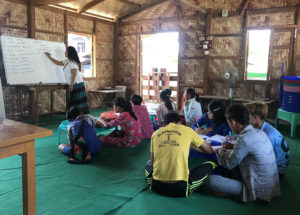 So this year they are offering English at the 8th and 9th grade levels (rather than 9th and 10th as we did last year), plus Burmese and mathematics at grades 9 and 10 levels. The program is overseen by a board of five individuals, along with input from an advisory group consisting of adult representatives from the IDP camps. The changes are all based on what the local people believe is best for helping students get what they need to be able to not only remain in school, but to excel. The program was just getting underway when I had to leave, but there were students registered from four or five camps representing several denominations and several ethnic groups. Bringing harmony among the various parts of the Body of Christ has also been one of my major objectives ever since my first trip there in 2009.
So this year they are offering English at the 8th and 9th grade levels (rather than 9th and 10th as we did last year), plus Burmese and mathematics at grades 9 and 10 levels. The program is overseen by a board of five individuals, along with input from an advisory group consisting of adult representatives from the IDP camps. The changes are all based on what the local people believe is best for helping students get what they need to be able to not only remain in school, but to excel. The program was just getting underway when I had to leave, but there were students registered from four or five camps representing several denominations and several ethnic groups. Bringing harmony among the various parts of the Body of Christ has also been one of my major objectives ever since my first trip there in 2009.
The local organizers have also been able to raise additional funding from their own community. All of the decisions are made by the people who are local to the situation, in spite of their repeated attempts to get me to approve of things. My role has been to encourage and advise.
I should also mention that while I was there earlier this March, I became aware of another young man who is teaching English in another IDP camp. When I asked him about his work, he shared with me that the camp is very poor, and that he and two others were doing the best they could to teach about 100 children of younger ages English, but that they had a severe lack of resources. I was able to provide him with a little bit of money to help buy supplies, but also gave some additional funds to the leaders of the Tzedakah program who agreed to meet with him and find a way to appropriately assist him. Three of the leaders have now visited his program and will be providing some assistance there as well.
What are some ways you have seen God personally show up as you continue to walk through open doors in Myanmar?
Every time I go I see and hear of more opportunities to to come along side some there. A while back I had a conversation with Gary Cantwell of PRC who introduced me to some folks with The Navigators who are engaged in educational program development in many countries. As a result, a couple of them showed up in Kachin State to do some teacher training and English language instruction. They have been back on their own since, and may show up there again soon! As the result of another meeting with fellow PRC member and personal friend Jerry White of The Navigators, I have gotten connected with other resources in the areas of agriculture and medical training.
My primary focus has clearly transitioned toward doing things that hopefully will improve the quality of life for people in the IDP camps, as well as the Kachin ethnic group at large. It is my sincere hope that many will be able to make their way out of the camps, and God has introduced me to local people with the same heart. Last November I was introduced to a businessman there who has about 1,000 acres of farm land near the city where I was at. When I met him he told me of his desire to help the farmers learn more effective and modern methods, but he lacked the technical expertise to set something up.
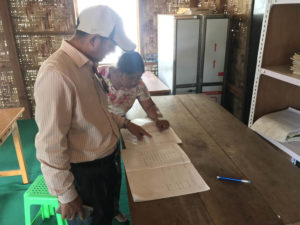 I had actually been trying to figure out how to get something going that would help develop the agricultural sector before I met that man, and had made some contacts. When I got home I dug into some things a bit, resulting in my making contact with a Christian agricultural development group that has an experimental and seed production farm in neighboring Thailand. During my last trip there I made an adjustment to my travel plan so I could visit their program with two others from Kachin State. The director of that program is now planning to make a trip to Kachin State in October to determine how they might participate in the establishment of a training program for local farmers there.
I had actually been trying to figure out how to get something going that would help develop the agricultural sector before I met that man, and had made some contacts. When I got home I dug into some things a bit, resulting in my making contact with a Christian agricultural development group that has an experimental and seed production farm in neighboring Thailand. During my last trip there I made an adjustment to my travel plan so I could visit their program with two others from Kachin State. The director of that program is now planning to make a trip to Kachin State in October to determine how they might participate in the establishment of a training program for local farmers there.
I have also recently been introduced to some people there who are making an investment in a new private hospital (that will need good doctors and other medical professionals), and a group that has just launched an effort to establish a local bank that will be owned and operated by Kachin people. Interestingly, God has given me contacts that have global expertise in these areas who have indicated a willingness to get involved.
There was another thing that sort of popped out of a related task I had taken on. I have had a fair amount of involvement with a Christian graduate university where I did my doctoral program after retiring from my engineering work. Last May I taught a course for doctoral students that included spending a couple of weeks in Kuala Lumpur, Malaysia. Through the connections of a good friend of mine who was previously the managing director for Hewlett-Packard in Malaysia, that course was hosted at a very successful Christian university there. During my last trip in February and March, I was able to introduce the manager of higher education programs for the Kachin Education Foundation to leaders at that university, as well as another successful Christian college in Kuala Lumpur. I am hoping that the foundation and those universities will be able to arrive at an arrangement for students from Kachin State to be able to study in Malaysia.
There are some other developments that are emerging as well, but I fear I have already rambled on too long!
Are there any ways that people reading this can help or come alongside the work you are doing?
Actually, one thing that I have thought about, but never quite gotten to the point of trying to put together is a small group of godly people to advise me on the various activities I find myself involved in. I could really use some folks who would be a sounding board for the things I am doing, as well as helping me moderate my enthusiasm a bit! If in the process some find themselves being prompted by the Holy Spirit to take a look for themselves at some of the needs and opportunities to help people on the other side of the world, I would be delighted to introduce them to some of my friends there! In fact, I would be delighted to share my experiences with any who sense that God might have been preparing them for some sort of involvement someplace that they don’t know very much about.
When I retired nearly 12 years ago, I never would have guessed that I would become involved with this sort of thing (I didn’t even know where on earth Myanmar was before I met my friend from there during one of my first courses in my doctoral program!). Who knows, perhaps God has been nudging some others here at PRC is a similar manner! If you would like to chat more feel free to email me.
Anything else I forgot to ask that you want to share with us?
I just want to say again how much I appreciate the inspiration, support and encouragement I have received from PRC. I am grateful that my wife Diana and I have found such sweet fellowship!
Steve and his wife Diana attend Pulpit Rock and a part of the Growing Together class on Sunday mornings.


